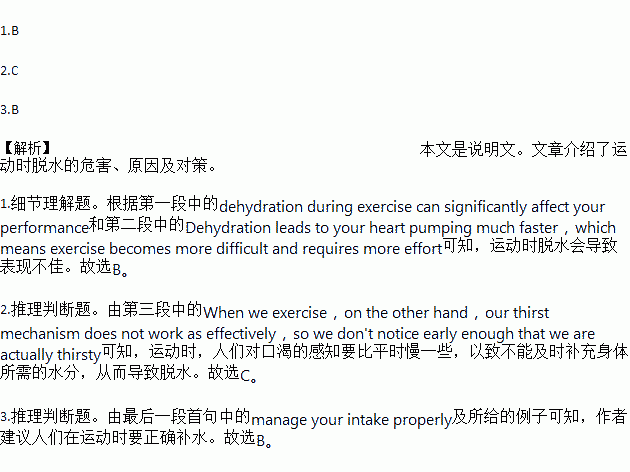题目内容
Did you know that sixty per cent of your body weight is water? However,
a loss of only two per cent of this water throughdehydration(脱水) during exercise can significantly affect your performance. The more you sweat, the more your exerciseperformance declines, unless you drink enough to replace your lossof fluids.
When you lose too much water, you can overheat quite easily,especially in a warm environment.But this is not the only problemyou may face. Dehydration leads to your heart pumping muchfaster, which means exercise becomes more difficult and requiresmore effort. Despite these problems, however, many of us simplydo not take enough fluids in when we head for the gym or set outon a run.
So why is this? How do we manage to lose so much waterwithout simply drinking more toreplace it? Well, it?s easier thanyou think. When we are at rest, we quickly become aware that weare thirsty and will put that right by having a drink. When weexercise, on the other hand, our thirstmechanism(结构) does notwork as effectively, so we don?t notice early enough that we areactually thirsty. In fact, we only start to feel thirsty when we havealready lost around two per cent of our body weight.
Another problem is that, the more dehydrated we becomeduring exercise, the more difficult it is to prevent furtherdehydration—because our stomachs become intolerant to fluidsand we do not absorb water properly, just when we need it most.
The key thing about fluids and exercise is to manage yourintakeproperly
—regular small amounts are preferable, and someshould be drunk before the period of exercise begins. You alsoneed to match your intake to the sort of exercise you are doing. For example, for one hour of exercise, such as taking part in a 10 km run, you need to drink about two extra litres of water. For longer periods of exercise, sports drinks are recommended.
1.We know from the text that during exercise, dehydration _____.
A. can be easily avoided
B. will lead to poor performance
C. can cause many health problems
D. will be controlled whenever we drink again
2.Why do people suffer from dehydration easily during exercise?
A. Their thirst mechanism stops working. B. Their focus is on the exercise.
C. Their thirst response is slow. D. Their stomachs are full.
3.When exercising, you are advised to _____.
A. have regular breaks B. drink water accordingly
C. drink sports water in advance D. have at least two litres of water
 捷径训练检测卷系列答案
捷径训练检测卷系列答案 小夫子全能检测系列答案
小夫子全能检测系列答案
